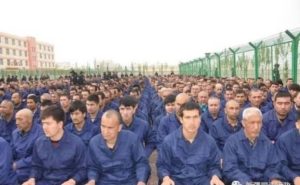This week, we mark another major advocacy win as the House of Representatives approved the Uyghur Forced Labor Prevention Act in a near-unanimous vote of 406-3. This legislation presumes that all goods produced, in whole or in part, in the Xinjiang region of China are the product of Uyghur forced labor and bans these goods from entry into any U.S. port. The bill also imposes sanctions on the architects of the forced labor system and calls for the State Department to make a determination of whether crimes against humanity and genocide are underway in East Turkestan – the Uyghurs’ preferred name for the Xinjiang region of China.
Jewish World Watch hails this critical development, but the work is not over. Many items in our own homes may be the product of the worst system of forced labor since World War II. If passed in the Senate and signed into law, this bill would stop Americans from unwittingly benefitting from Uyghur atrocities. Please click here to help ensure this bill’s passage in the Senate.
[maxbutton id=”71″]
Why the Uyghur Forced Labor Prevention Act matters
Uyghurs have been interned in a vast constellation of camps throughout the East Turkestan region of China. Forced labor is only the tip of the iceberg when it comes to the litany of egregious violations they are experiencing at the hands of the Chinese government, including extrajudicial killings, family separation, forced political indoctrination, organ harvesting, rape, torture, prevention of births, and the destruction of Uyghur culture. In July, U.S. Customs and Border Protection seized a 13-ton shipment of hair weaves, suspected to be taken from and forcibly produced by Uyghur women in East Turkestan. The taking of human hair resonates deeply with the Jewish experience, as does leaked footage of Uyghurs, blindfolded and shackled, being led from a train. The scope of the Uyghur forced labor problem is staggering. 84% of China’s cotton production comes from the Uyghur region, which means 20% of the world’s cotton is sourced from there. As many as 1 in 5 cotton garments in the world market are likely tainted by Uyghur forced labor. But it doesn’t stop at cotton. Finished apparel, hair products, computer parts, and other common goods are produced by Uyghur forced labor as well. What’s troubling about the Uyghur forced labor situation is that many household names are potentially complicit in fueling the Uyghur labor machine, whether they know it or not. By blocking goods produced in East Turkestan from entering the U.S., the bill protects us as consumers from unwittingly benefitting the perpetrators of potential genocide. It also protects U.S. corporations from fueling this monstrous machinery. The legislation makes the critical finding that ordinary due diligence to ensure clean supply chains is unreliable in the Uyghur region because forced labor has been so seamlessly integrated into the regional economy and surveillance and coercion are so systemic. Since the cleanness of the goods is exceedingly difficult to establish, the legislation assumes everything from the region is tainted by forced labor and blocks it from entering our shores, unless U.S. Customs and Border Protection can demonstrate they are clean with “clear and convincing evidence.” The United States has assumed a real leadership role in countering China’s policies and holding it accountable for the atrocious abuses it is perpetrating against its own citizens. This June, the President signed the Uyghur Human Rights Policy Act into law. Jewish World Watch, with your support, was instrumental in bringing about this major advocacy victory. In July, the Department of Commerce’s Bureau of Industry and Security added eleven Chinese companies to an entities list, implicating them in gross human rights violations, including forced labor and high-tech surveillance of Uyghurs. The Trump Administration imposed sanctions on these companies and added even more sanctions against a powerful government entity and two Chinese officials in August.What can you do
We need to rally together now to make sure the Uyghur Forced Labor Prevention Act passes the Senate. There is tremendous bipartisan and bicameral support for addressing the Uyghur crisis, especially amid the challenges and unknowns of COVID-19. While Jewish World Watch is a global organization, our strongest base is in California, where we are located. Senators Diane Feinstein and Kamala Harris have yet to co-sponsor this legislation, but they are friends of JWW and of the Uyghurs. JWW and our Uyghur diaspora allies visited both senators’ offices last year to ask for their support of the Uyghur Human Rights Policy Act – which both senators endorsed, crediting JWW for influencing their decision to co-sponsor. Since our meetings, both Senators Harris and Feinstein have gone on to champion the Uyghur cause and decry China’s abuses. The Uyghur Forced Labor Act, a relatively new piece of legislation, may simply not be on their radar. It’s our job to alert them to this important bill and get them to sign on NOW. Please take a moment to send this letter to your senators and ask them to co-sponsor this bill that directly impacts us all and could make a huge difference in dismantling China’s systemic abuses.[maxbutton id=”71″]


